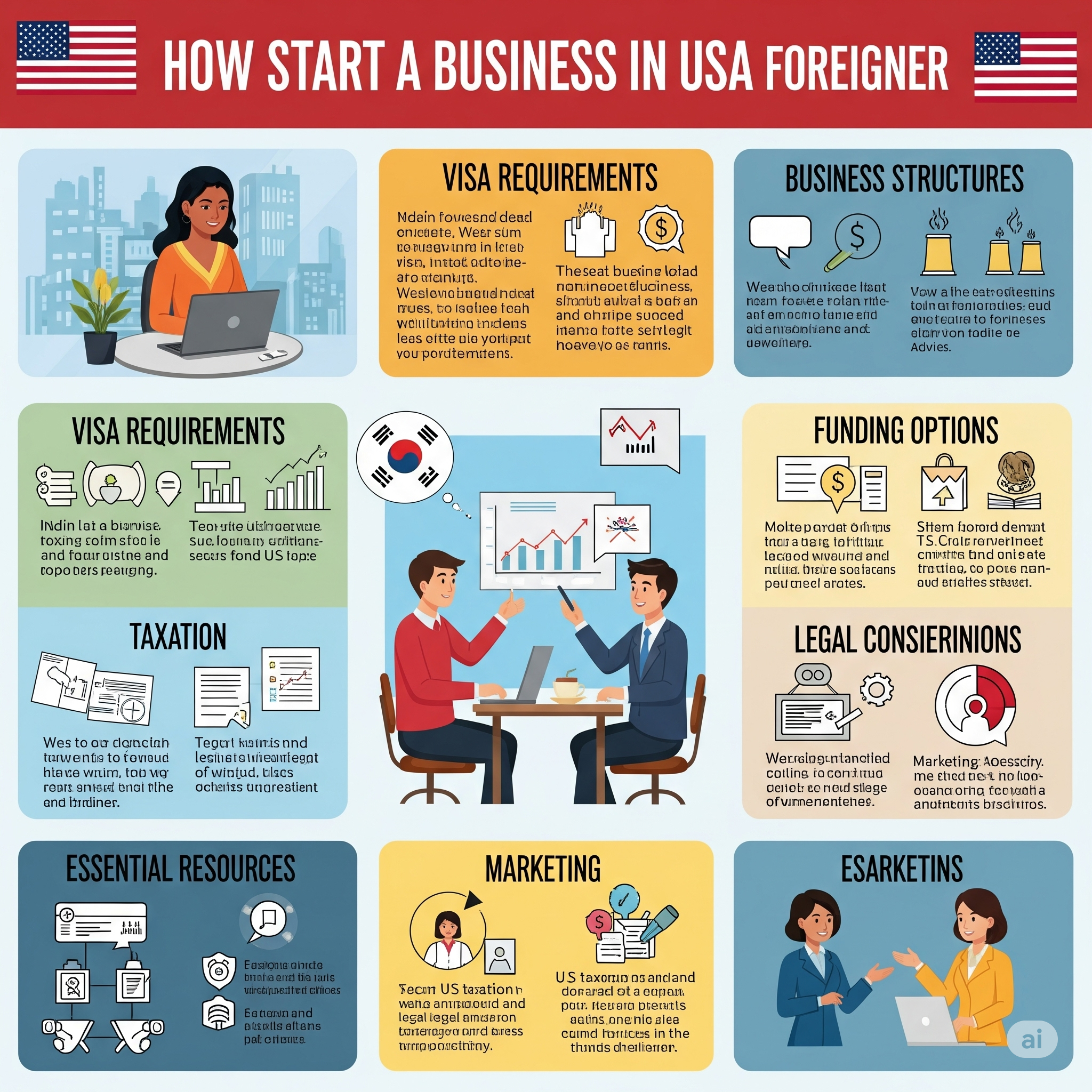Starting a business in the United States as a foreigner is not only possible—it’s increasingly common. The U.S. is known for its business-friendly environment, a strong legal framework, and access to one of the largest consumer markets in the world. However, there are specific steps and legal requirements non-residents must follow. This guide walks you through everything you need to know, from choosing the right business structure to navigating visa requirements.
1. Can a Foreigner Start a Business in the USA?
Yes. There are no laws that prohibit non-U.S. citizens or non-residents from owning or starting a business in the U.S. You don’t need to be a U.S. citizen or have a green card to register and own a company. However, running the business inside the U.S. physically will involve visa or immigration considerations.
2. Choose the Right Business Structure
There are a few types of business entities foreigners can set up:
Limited Liability Company (LLC)
- Popular choice due to simplicity, flexibility, and liability protection.
- Can have foreign owners (“members”).
- Profits pass through to the owner’s personal tax return (unless structured differently).
Corporation (C-Corp)
- Allows unlimited foreign shareholders.
- Ideal for raising venture capital or issuing shares.
- Subject to double taxation (corporate and personal level).
S-Corp
- Not available to foreigners. Only U.S. citizens or permanent residents can own S-Corps.
Recommendation: Most foreign entrepreneurs start with either an LLC or a C-Corp, depending on tax preferences and long-term goals.
3. Decide on a State to Register Your Business
You can register your business in any U.S. state. Some states are more business-friendly than others.
Popular choices:
- Delaware: Corporate-friendly laws and flexible business structure.
- Wyoming: Low fees, no state income tax, privacy for owners.
- Nevada: No state income tax and strong asset protection.
Note: If you plan to physically operate your business in a specific state (e.g., open a shop in Florida), you must register there.
4. Register Your Business
Once you decide on a state and structure:
- Choose a business name.
- Appoint a Registered Agent (a person or company with a U.S. address to receive legal documents).
- File Articles of Organization or Incorporation with the state government.
- Pay the state filing fee (varies by state, typically $50–$300).
5. Apply for an EIN (Employer Identification Number)
You need an EIN (similar to a business Social Security number) from the IRS for:
- Opening a U.S. bank account.
- Hiring employees.
- Paying taxes.
How to apply:
- Online via IRS website (only for those with a U.S. Social Security Number).
- Or, file Form SS-4 and send it by fax or mail if you don’t have an SSN or ITIN.
6. Open a U.S. Business Bank Account
To operate smoothly, you’ll need a U.S.-based business bank account. Requirements usually include:
- EIN.
- Articles of Organization or Incorporation.
- Passport or valid government ID.
- U.S. address (sometimes).
Some banks may require you to visit in person, although some fintech solutions (like Mercury, Wise, or Payoneer) allow remote account setup for foreigners.
7. Understand U.S. Tax Obligations
Foreign-owned businesses must comply with U.S. tax laws, which vary by state and federal level.
- LLCs: Income may be subject to withholding tax if the owner is non-resident.
- C-Corps: Pay corporate income tax on U.S. earnings.
- File annual tax returns and possibly quarterly estimated taxes.
Tip: Consult a U.S. tax advisor with international experience.
8. Get the Right Visa (If You Plan to Live/Work in the U.S.)
If you plan to manage your business physically from the U.S., you’ll need a visa. Common options include:
- E-2 Visa (Investor Visa): For citizens of treaty countries who invest a “substantial amount” in a U.S. business.
- L-1 Visa: For internal company transfers (from a foreign branch to the U.S.).
- O-1 Visa: For individuals with extraordinary ability (e.g., tech founders, artists).
Immigration laws are complex, so speak with an immigration attorney before applying.
9. Maintain Compliance and Stay Legal
Once your business is registered:
- File annual reports (required in most states).
- Renew licenses and permits.
- Pay state and federal taxes.
- Maintain good standing with the state (to avoid fines or dissolution).
Pros and Cons of Starting a Business in the USA as a Foreigner
Advantages:
- Access to a huge, wealthy consumer market.
- Strong legal system protecting property and contracts.
- Global reputation and trust in U.S. businesses.
- Easier access to funding (venture capital, investors).
Disadvantages:
Ongoing compliance and reporting requirements.
U.S. tax laws can be complex.
Banking and legal setup can be slow for non-residents.
May require a visa to work or manage the business in person.

